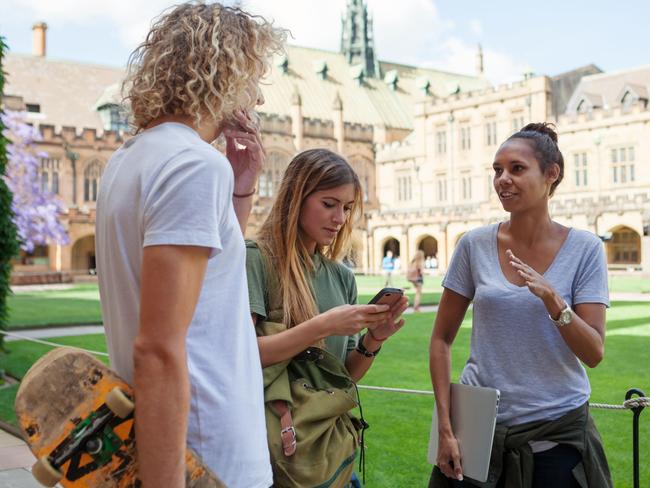
The risk is that protectionism in trade will extend to research.
The Wall Street Journal nailed it last week with a headline on Donald Trump’s tariffs: “With new trade regime, US aims to topple the age of globalisation.”
This is very bad indeed for everybody, everywhere, because a driver of economy-growing, disease eradicating, ordinary people enriching globalisation is scientific research.
With governments abandoning policy for tit-for-tatting tariffs on trade in goods, the risk is this escalates to ideas, that last week’s import taxes could be the beginning of the end of academics co-operating across borders in research that serves humanity.
And a great age for humanity it has been – as Trump used to get, when he funded Operation Warp Speed that created a Covid vaccine in 12 months. “We harnessed the full power of government, the genius of American scientists, and the might of American industry to save millions and millions of lives all over the world,” he said
Now he has lost that particular plot and US trade policy is based on 17th-century economics, Trump has adopted mercantilism, which assumes the world’s wealth is finite and nations win when they accumulate more of it by out-trading competitors and socking the surplus away in bullion. Tariffs are a great way to rig the game – sure they are a tax on ordinary people who buy imports but 17th-century monarchs did not much care about consumers. Neither, it appears, does Trump.
Imposing mercantilism on the research papers that are the products of science is not far from Trump’s ideological loyalty pledge, requiring academics, including foreign researchers with US government funding, to admit to their sins on all things woke and to declare links with China, Russia, Iran and Cuba. Cue outrage from Australian lobbies, with the National Tertiary Education Union warning “a foreign government seeking to destroy public education globally must have zero influence on what Australian researchers and their international colleagues work on”.
This is ridiculous; the US government can fund or not fund what it likes. Also ridiculous are suggestions last week that the Australian government should now consider the US the equivalent of the People’s Republic of China. There may be US scientists with covert Defence Department connections working on Australian projects but there definitely have been cases of Chinese researchers linked to the Peoples Liberation Army. And while the US imposition of 10 per cent tariffs slugs Australian exports, it is nothing like the PRC’s attempt to destroy Australian exports for the high crime of the Morrison government inquiring where exactly in Wuhan did Covid come from.
Yet while the US and China updated their 45-year agreement to make-nice in research in the lame duck days of the Biden administration, Trump could easily abandon it and firmly invite allies to abandon the PRC for whatever real or trumped-up reason.
Checking that they do would not be hard. Off-the-shelf analytics make it easy to identify Australia-based researchers co-writing papers with Chinese researchers by institution and, just as important, discipline. The White House could (outrage and law suits aside) require researchers from anywhere and everywhere to stop publishing with Chinese scientists in strategic disciplines in to be eligible for US government funding – which would not encourage US universities to partner with international institutions. And “strategic” could mean whatever the president and panjandrums could want it to mean.
Penny Wong gets times have changed and can keep changing. Last week, Labor’s Foreign Minister told ABC RN that “we have to recognise we live in a different world … we will continue to make the case to the US that collaborative research benefits both countries but making sure we diversify our engagement across all our economic sectors”.
But with who? Research lobbies are talking up the EU’s Horizon Europe funding program, which Australia could join as an associate member – New Zealand has. Except that what suits the EU may not suit us – one of Australia’s great research strengths is in mining, unlikely to be green-enough for EU officialdom. Plus no one is talking about return on investment. While the Australian government has said in the past that it has never been invited to join Horizon Euro, that might be because it decided it was too expensive and did not ask.
Which means China is now the only research alternative to the US, catching when it is not outpacing the US in science research. The Australian Strategic Policy Institute looked at research leadership last year, measured by citations of papers in 64 “critical technologies”.Twenty years ago the US led in 60 and China in three; now the Americans are top in seven and PRC researchers in 57. This does not make the case for switching sides in an ideas arms race – the US is way better at research diffusion but, AUKUS permitting, we could look to China if Trump started making the US an unreliable ally. Except that China as our new great and powerful science friend is a hard sell. Ask wine makers and barley growers.
The Chinese Communist Party uses research as an arm of state power. There is a new statement from Xi Jinping that sets the objective – “mobilise resources nationwide for major tasks to boost high-level self-reliance and strength in science and technology.”
A commitment to science in the service of humanity this is not. As the excellent ASPI reports, the huge and powerful Chinese Academy of Science is a ministerial-level institution reporting to cabinet, big in computing technologies, nuclear weapons and intercontinental ballistic missiles. According to ASPI, the academy has “a robust internal Communist Party apparatus”

This did not stop Australian vice-chancellors sucking up to the PRC for years. The case for full-fee Chinese students has long been that their fees fund research the Australian government does not. But not so much since Covid-era trade thuggery and more recently Chinese warships started turning up off our coast projecting power.
Diarmiud Cooney-O’Donoghue (Monash University) reports the way Australian Research Council projects that included Chinese partners grew for 20 years before falling off a funding cliff in 2022. Last week, the University of Queensland admitted it had not renewed its Confucius Institute contract – turns out five other universities cancelled theirs.
So if ideological push came to research partnership shove, the choice of camp we should join is clear – neither, at least not if we have a choice. Just as a free market in goods is essential to Australia as a trading nation, so is open access to science.
One sure way to ensure the world is poorer is to turn science into a great-power pawn where smaller countries make the least-worst deal for access to resources.
As happened in 17th-century Europe.







Academics who denounce globalisation as capitalism run riot will miss it when it is gone – and right now it is on the way out.